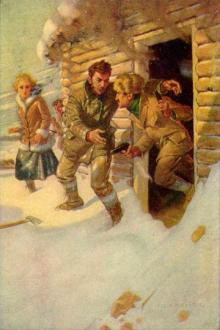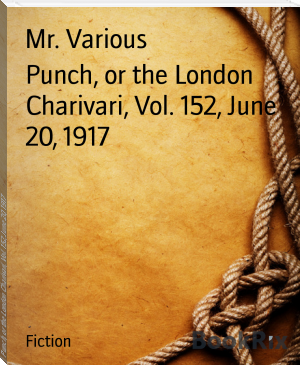The Gun-Brand by James B. Hendryx (thriller book recommendations .TXT) 📕

- Author: James B. Hendryx
- Performer: -
Book online «The Gun-Brand by James B. Hendryx (thriller book recommendations .TXT) 📕». Author James B. Hendryx
"For these things I have hated and feared him. Since I have been here at the school I have learned much. Both from your teachings, and from talking with the women of MacNair's Indians. I know now that MacNair is good, and that the factors and the soldier-police and the priest spoke words of truth, and that Lapierre and the free-traders lied!"
As the Indian girl poured forth her story, Chloe Elliston listened as one in a dream. What was this she was saying, that it was Lapierre who sold whiskey to the Indians, and MacNair who stood firm, and struck mighty blows for the right of things? Surely, this girl's mind was unhinged—or, had something gone wrong with her own brain? Was it possible she had heard aright?
Suddenly she remembered the words of Corporal Ripley, when he asked her to withdraw the charge of murder against MacNair: "In the North we know something of MacNair's work." And again: "We know the North needs men like MacNair."
Could it be possible that after all—with the thought there flashed into the girl's mind the scene on Snare Lake. Had she not seen with her own eyes the evidence of this man's work among the Indians! With a gesture of appeal she turned to Big Lena.
"Surely, Lena, you remember that night on Snare Lake? You saw MacNair's Indians, drunk as fiends—and the buildings all on fire? You saw MacNair kicking and knocking them about? And you saw him fire the shots that killed two men? Speak, can't you? Did you see these things? Did I see them? Was I dreaming? Or am I dreaming now?"
Big Lena shifted her weight ponderously, and the stare of the china-blue eyes met steadily the half-startled eyes of the girl. "Yah, Ay seen das all right. Dem Injuns dey awful drunk das night and MacNair he come 'long and schlap dem and kick dem 'round. But das gude for dem. Dey got it comin'. Dey should not ought to drink Lapierre's vhiskey."
"Lapierre's whiskey!" cried the girl. "Are you crazy?"
"Naw, Ay tank Ay ain't so crazy. Lapierre he fool ju long tam'."
"What do you mean," asked Chloe.
"Ah, das a'right," answered the woman. "He fool ju gude, but he ain't fool Big Lena. Ay know all about him for a jear."
"But," pursued the girl, "Lapierre was with us that night!"
Lena shrugged. "Yah, Lapierre very smart. He send LeFroy 'long wit' das vhiskey. Den v'en he know MacNair's Injuns git awful drunk, he tak' ju 'long for see it."
"LeFroy!" cried Chloe. "Why, LeFroy was off to the eastward trying to run down some whiskey-runners."
Big Lena laughed derisively. "How ju fin' out?" she asked.
Chloe hesitated. "Why—why, Lapierre told me."
Again Big Lena laughed. "Yah, Lapierre tal ju, but, LeFroy, he don't know nuthin' 'bout no vhiskey-runners. Only him and Lapierre dos all de vhiskey-running in dis country. LeFroy, he tal me all 'bout das. He tak' das vhiskey up dere and he sell it to MacNair's Injuns, and MacNair shoot after him and kill two LeFroy's men. Ay goin' marry LeFroy, and he tal me de trut'. He 'fraid to lie to me, or Ay break him in two. LeFroy, he bane gude man now, he quit Lapierre. Ju bet ju if he don't bane gude Ay gif him haal. Ay tal him it bane gude t'ing if MacNair kill him das night.
"Den MacNair come on de school and brung de policeman, LeFroy he 'fraid for scart, and he goin' hide in de kitchen, and Ay drag him out and brung him 'long to see MacNair. LeFroy, he 'fraid lak' haal. He squeal MacNair goin' kill him. But Ay tal him das ain't much loss annyhow. If he goin' kill him it's besser he kill him now, den Ay ain't got to bodder wit' him no more. But MacNair, he don't kill him. Ay tal him LeFroy goin' to be gude man now, and den MacNair he laugh, and tal LeFroy to go 'long and git out de grub."
"But," cried Chloe, "you say you have known all about Lapierre for a year, and you knew all the time that MacNair was right, and Lapierre was wrong, and you let me go blindly on thinking Lapierre was my friend, and treating MacNair as I did! Why didn't you tell me?"
"Ju got yoost so manny eyes lak' me!" retorted the woman. "Ju neffer ask me vat Ay tank 'bout MacNair and 'bout Lapierre. And Ay neffer tal ju das 'cause Ay tank it besser ju fin' out yourself. Ay know ju got to fin' das out sometam'. Den ju believe it. Ju know lot 'bout vat stands in de books, but das mos' lak' MacNair say: 'bout lot t'ing, you damn fool!"
Chloe gasped. It was the longest speech Big Lena had ever made. And the girl learned that when the big woman chose she could speak straight from the shoulder.
Harriet Penny gasped also. She pushed back her chair, and shook an outraged finger at Big Lena. "Go into the kitchen where you belong!" she cried. "I really cannot permit such language in my presence. You are unspeakably coarse!"
Chloe whirled on the little woman like a flash. "You shut up, Hat Penny!" she snapped savagely. "You don't happen to do the permitting around here. If your ears are too delicate to listen to the truth you better go into your own room and shut the door." And then crossing swiftly to her own room, she opened the door, but before entering she turned to Big Lena, "Make a pot of strong coffee," she ordered, "and bring it to me here."
A few minutes later when the woman entered and deposited the tray containing coffee-pot, cream-pitcher, and sugar-bowl upon the table, she found Chloe striding up and down the room. There was a new light in the girl's eyes, and, very much to Big Lena's surprise, she turned suddenly upon her and throwing her arms about the massive shoulders, planted a kiss squarely upon the wide, flat mouth.
"Ah, Lena," she cried, happily, "you—you are a dear!" And the Swedish woman, with unexpected gentleness, patted the girl's shoulder, and as she passed out of the door smiled broadly.
For an hour Chloe paced up and down the little room. At first she could scarcely bring herself to realize that the two men, MacNair and Lapierre, had changed places. She remembered that in that very room she had more than once pictured that very thing. As the conviction grew upon her, her pulse quickened. Never before had she been so supremely—so wildly happy. There was a strange barbaric singing in her heart, as for the first time she saw MacNair—the real MacNair at his true worth. MacNair, the big man, the really great man, strong and brave, alone in the North fighting, night and day, against the snarling wolves of the world-waste. Fighting for the good of his Indians and the right of things as they should be.
Her mind dwelt upon the fine courage and the patience of him. She recalled the hurt look in his eyes when she ordered his arrest. She remembered his words to the officer—words of kindly apology for her own blind folly. She penetrated the rough exterior, and read the real gentleness of his soul. And then, with a shame and mortification that almost overwhelmed her, she saw herself as she must appear to him. She recollected how she had accused him, had sneered at him, had called him a liar and a thief, a murderer, and worse.
Tears streamed unheeded from her eyes as she recalled the unconscious pathos of his words as he stood beside his mother's grave. And the look of reproach with which he sank, to the ground when Lapierre's bullet laid him low. Her heart thrilled at the memory of the blazing wrath of him, the cold gleam of his eyes, the wicked snap of his iron jaw, as he said, "I have taken the man-trail!" She remembered the words he had once spoken: "When you have learned the North, we shall be friends." She wondered now if possibly this thing could ever be? Had she learned the North? Could she ever atone in his eyes for her cocksureness, her blind egotism?
Chloe quickened her pace, as if to walk away and leave these things behind. How she hated herself! It seemed to her, in her shame and mortification, that she could never look into this man's eyes again. Her glance strayed to the portrait of Tiger Elliston that stared down at her from its bullet-shattered frame upon the wall. The eyes of the portrait seemed to bore deep into her own, and the words of MacNair flashed through her brain—the words he had used as he gazed into the eyes of that selfsame portrait.
Unconsciously—fiercely she repeated those words aloud: "By God! Yon is the face of a man!" She started at the sound of her own voice. And then, like liquid flame, it seemed to the girl the blood of Tiger Elliston seethed and boiled in her veins—spurring her on to do!
"Do what?" she questioned. "What was there left to do, for one who had blundered so miserably?"
Like a flash came the answer. She had done MacNair a great wrong. She must right that wrong, or at least admit it. She must own her error and offer an apology.
Seating herself at the table, she seized a pen and wrote rapidly for a long, long time. And then for a long time more she sat buried in thought, and at the end of an hour she arose and tore up the pages she had written, and sat down again and penned another letter which she placed in an envelope addressed with the name of MacNair. This done she took the letter, tiptoed across the living-room, and pushing open the Louchoux girl's door entered and seated herself upon the edge of the bed. The Indian girl was wide awake. A brown hand stole from beneath the covers and clasped reassuringly about Chloe's fingers.
She handed the girl the letter.
"I can trust you," she said, "to place this in MacNair's hands. Go to sleep now, I will talk further with you tomorrow." And with a hurried good-night, Chloe returned to her own room.
She blew out the lamp and threw herself fully dressed upon the bed. Sleep would not come. She stared long at the little patch of moonlight that showed upon the bare floor. She tried to think, but her heart was filled with a strange restlessness. Arising from the bed, she crossed to the window and stared out across the moonlit clearing toward the dark edge of the forest—the mysterious forest whose depths seemed black with sinister mystery—whose trees bed-coned, stretching out their branches like arms.
A strange restlessness came over her. The confines of the little room seemed smothering—crushing her. Crossing to the row of pegs she drew on her parka and heavy mittens, and tiptoeing to the outer door, passed out into the night, crossed the moonlit clearing, and stepped half-fearfully into the deep shadow of the forest—to the call of the beckoning arms.
As her form was swallowed up in the blackness, another form—a gigantic figure that bore clutched in the grasp of a capable hand the helve of an ax, upon the polished steel of whose double-bitted blade the moonbeams gleamed cruelly—slipped from the door of the





Comments (0)